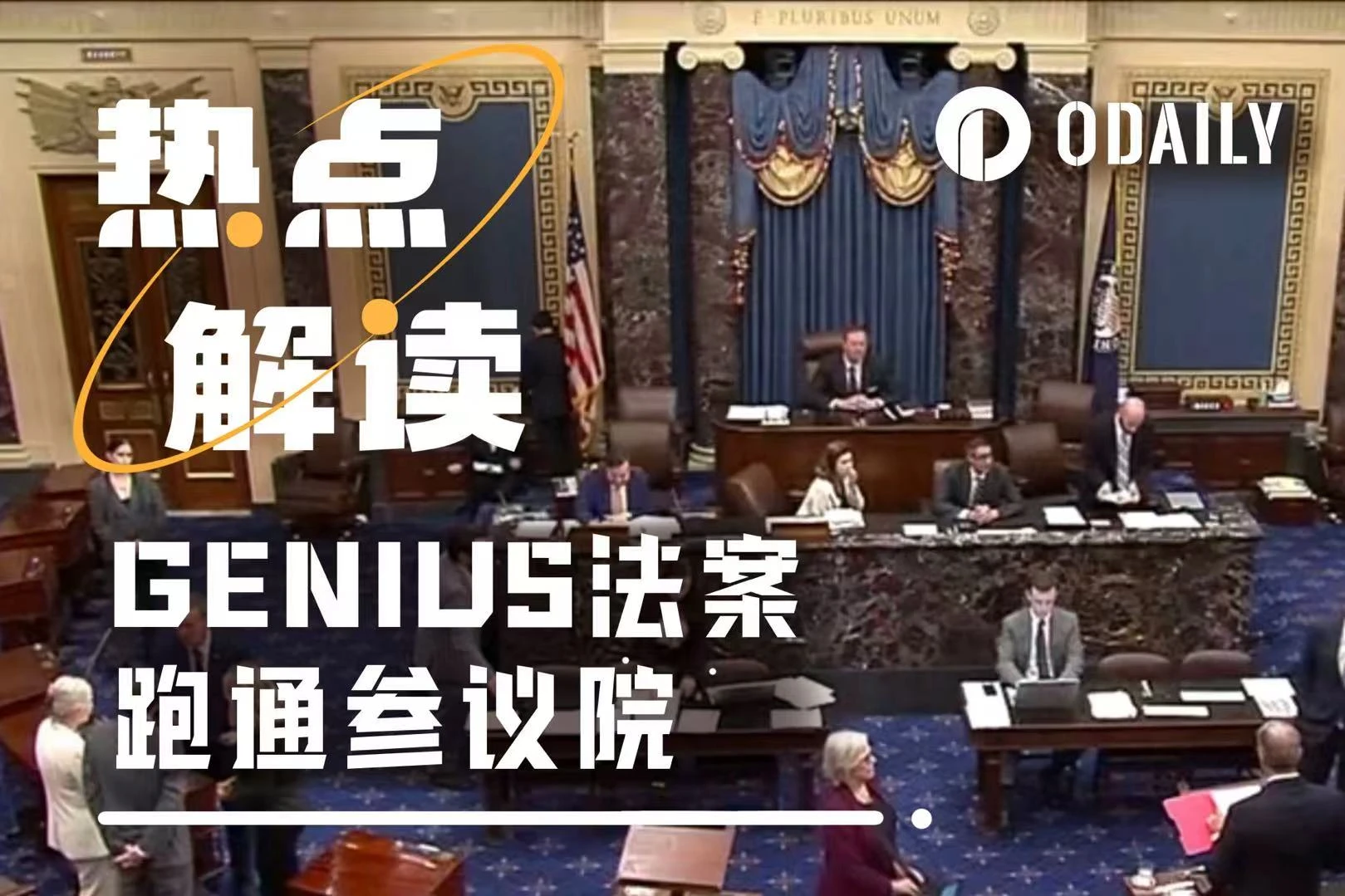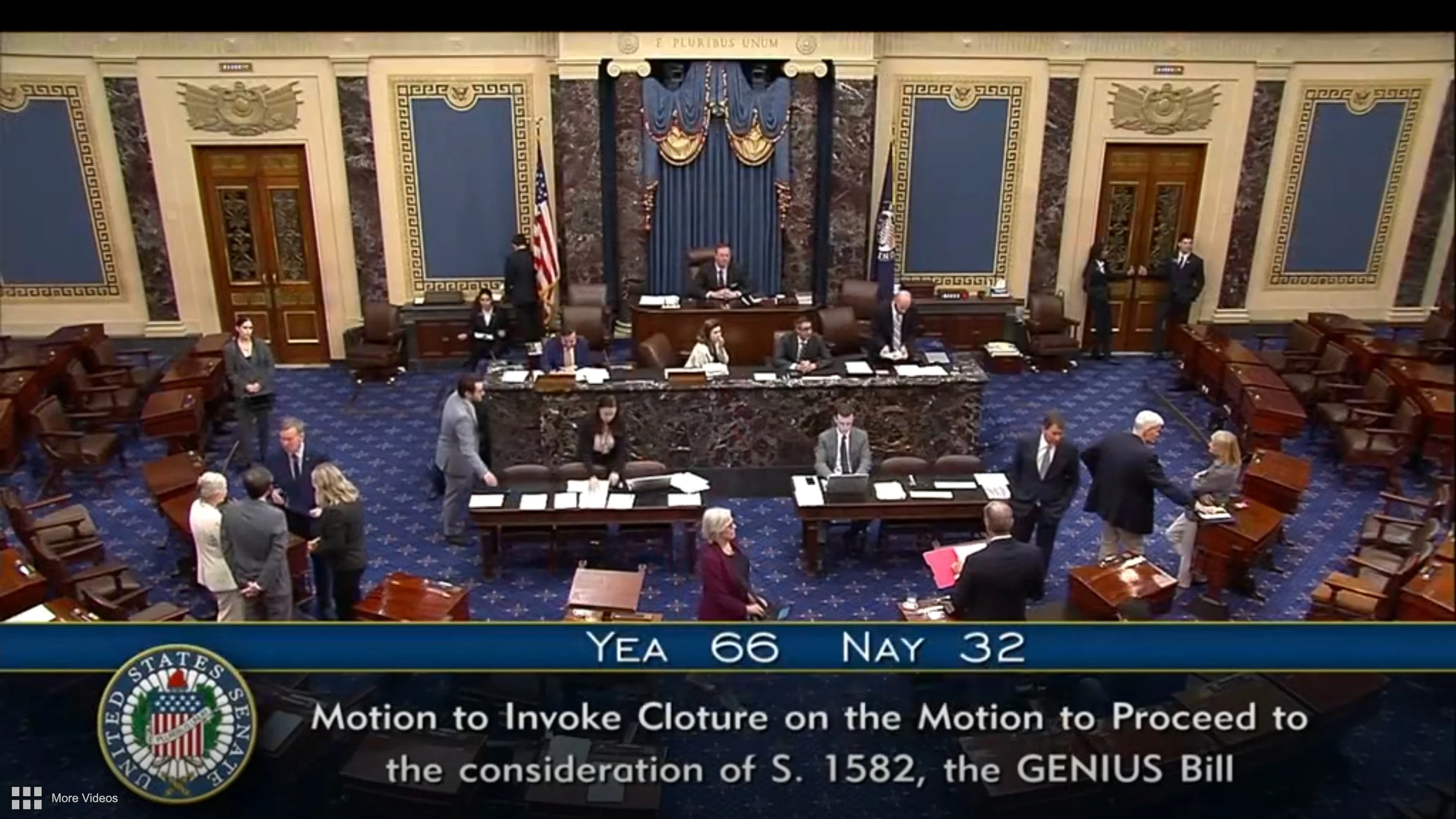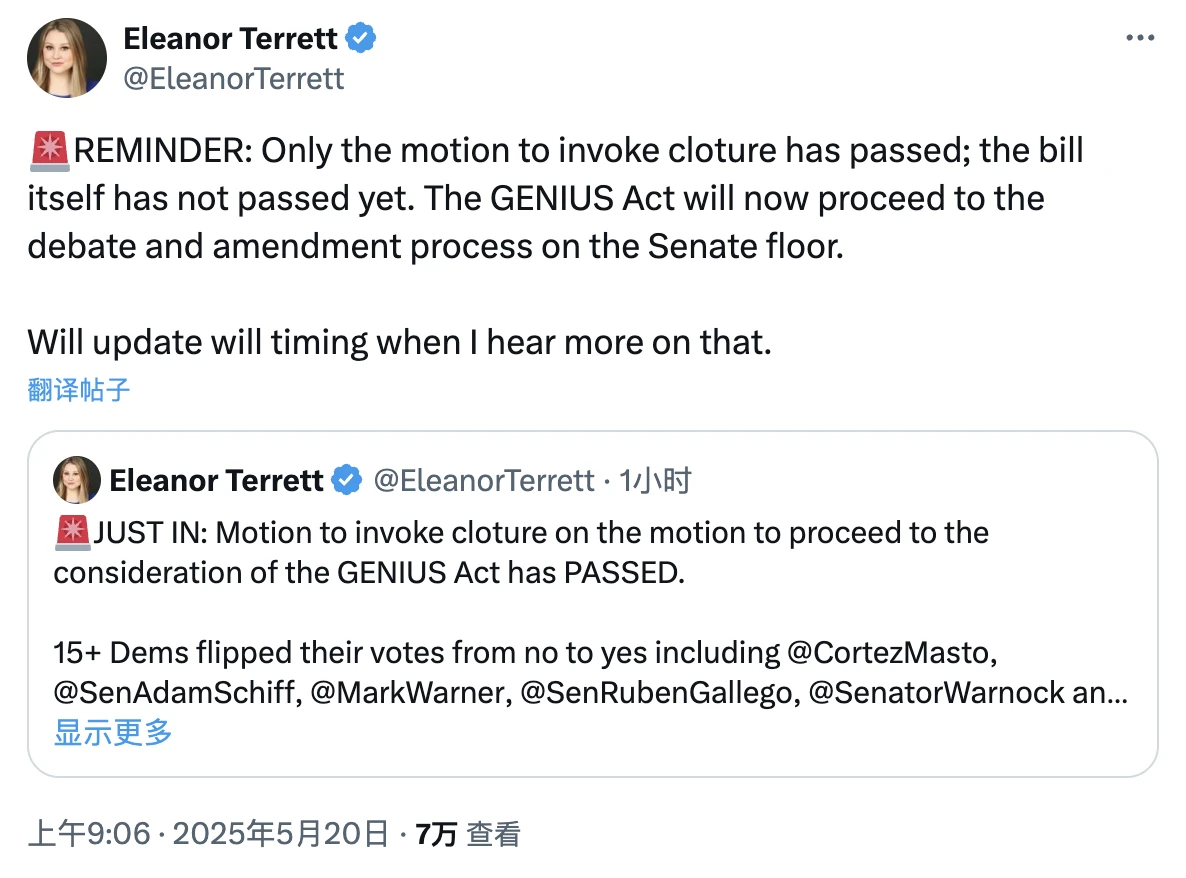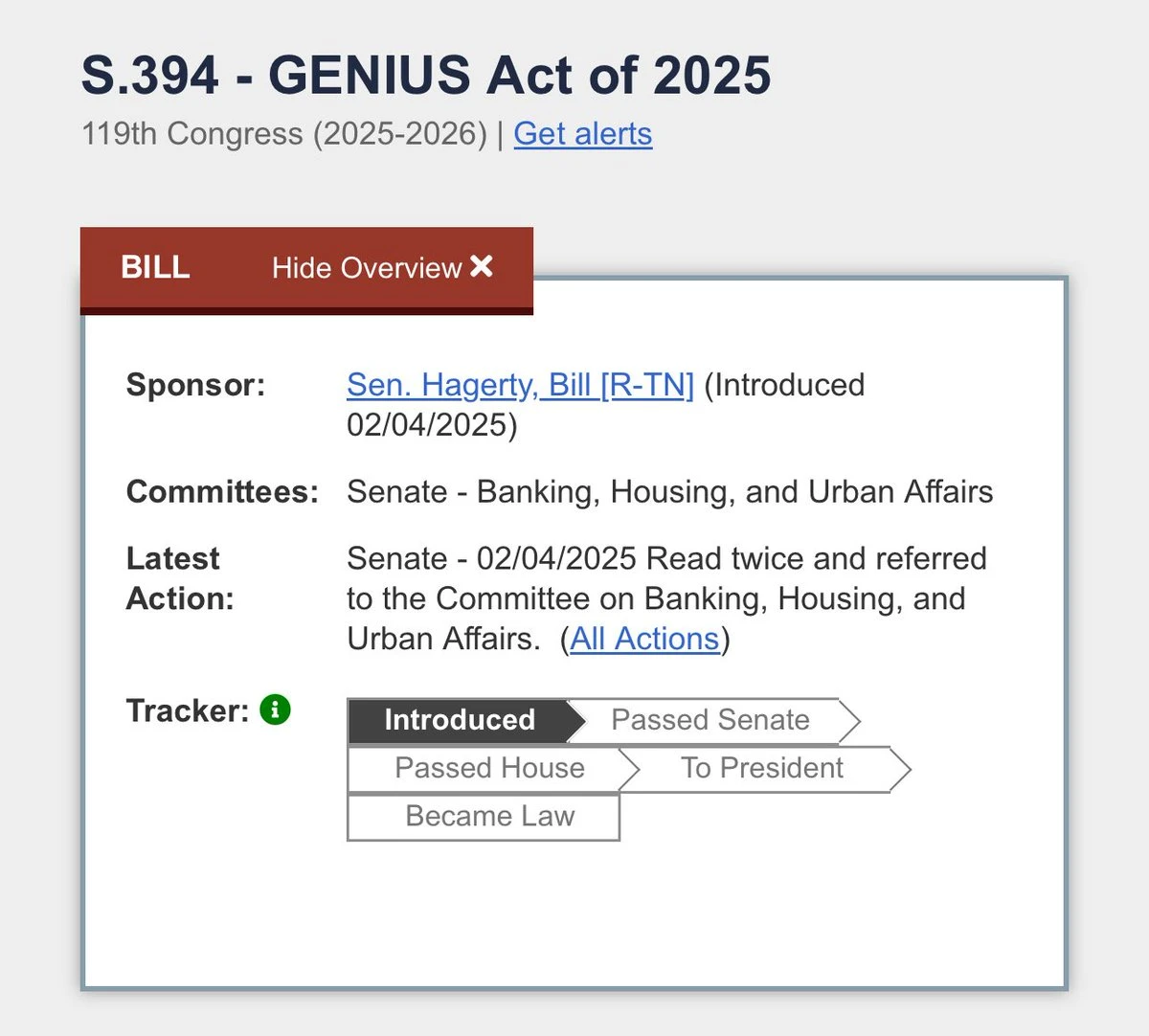Original | Odaily Planet Daily (@OdailyChina)
Author | Azuma (@azuma_eth)

On the morning of May 20, Beijing time, the highly anticipated stablecoin regulation bill (GENIUS Act) achieved a key breakthrough in a vote in the U.S. Senate — the Senate voted 66 in favor and 32 against to pass the cloture vote for the GENIUS Act. This means the Senate has agreed to stop debating the bill and will hold a final vote no later than 30 hours from now.

Will the final vote be completed?
It is important to emphasize that this morning, several media outlets and KOLs reported incorrectly on the latest progress of the GENIUS Act; in fact, the Senate only voted to pass the cloture vote, and the bill itself has not yet passed the final vote.

However, this can still be seen as a key breakthrough for the GENIUS Act in navigating the legislative process, as the cloture vote is a critical mechanism in the U.S. Congressional legislative process, specifically designed to break the deadlock caused by the minority party's desire to obstruct a bill's vote through "endless debate."
In the case of the GENIUS Act, Democratic senators, led by Elizabeth Warren, have been the main force obstructing the progress of the GENIUS Act. It was precisely due to the collective opposition of Democratic senators that the GENIUS Act failed to advance in the Senate vote on May 8, receiving only 49 votes (not reaching the minimum requirement of 60 votes). However, in this morning's cloture vote, 15 Democratic senators, including Adam Schiff and Mark Warner, changed their votes from no to yes — this means that in the upcoming final vote, these Democratic senators are likely to become the key force in passing the GENIUS Act through the Senate.
- Odaily Note: NBC reported that the reason several Democratic senators changed their votes was due to an agreement reached through negotiations between the two parties last week, in exchange for which the bill added some amendments, including changes to consumer protection measures and restrictions on tech companies issuing stablecoins, and expanded ethical standards to include certain government employees — this will temporarily apply to Musk and David Sacks.
Contents of the GENIUS Act
On February 4, 2025, U.S. Senators Bill Hagerty, Tim Scott, Kirsten Gillibrand, and Cynthia Lummis jointly proposed the "Guiding and Establishing National Innovation for US Stablecoins" (GENIUS Act), aimed at establishing a legal framework for the legal use of stablecoins for payments within the United States.
The core provisions of the bill are as follows:
Definition of payment stablecoins: Digital assets anchored to a fixed currency value, fully backed 1:1 by U.S. dollars or other highly liquid assets, specifically for payment settlement scenarios.
Dual licensing regulation: Federal regulation for issuers with a market capitalization exceeding $10 billion; state-level regulation allows smaller issuers to choose state registration (must meet federal equivalency standards).
100% reserve requirement: Reserve assets limited to cash, short-term U.S. Treasury securities, or central bank deposits, and must be segregated from operating funds. Monthly proof of sufficient reserves must be submitted to ensure users can redeem at face value.
Mandatory transparency disclosures: Regular public disclosure of reserve composition and redemption policies, subject to compliance audits by registered accounting firms.
Anti-money laundering compliance: Issuers will be subject to the Bank Secrecy Act, fulfilling AML obligations at the level of financial institutions.
Priority protection for users: In the event of issuer bankruptcy, stablecoin holders' claims will take precedence over other claimants.
Clear regulatory authority: Clearly states that payment stablecoins do not fall under the categories of securities, commodities, or investment companies, delineating regulatory boundaries.
In short, as the first federal-level stablecoin bill, the GENIUS Act is widely regarded in the industry as a significant advancement for stablecoins to move out of the phase of unregulated growth and into compliance, with the potential to advance into broader markets such as payments.
Due to the importance of the GENIUS Act, various parties in the industry have invested significant lobbying efforts to ensure that the bill can successfully navigate the legislative process and be implemented smoothly.
What comes next for the Senate?
According to U.S. legislative procedures, if the GENIUS Act successfully passes the Senate, it will still need to go through a vote in the House of Representatives, after which it will be submitted to President Trump for signing, and only then will it become law.

According to Barron's, the bill is expected to have a smoother review in the House of Representatives, as the House does not require an absolute majority to approve.
How is the market reacting?
Perhaps due to the positive boost from the key breakthrough achieved by the GENIUS Act in the Senate, the cryptocurrency market, which experienced a significant pullback yesterday, has seen a strong rebound today — BTC has once again crossed the $106,000 mark, with new highs seemingly just around the corner.
Looking ahead to the market changes after the GENIUS Act is implemented, as the first step for stablecoins to move towards compliance and broader markets, the bill is undoubtedly a huge benefit for the entire industry, with some projects closely related to stablecoins benefiting significantly — for example, Aave (AAVE), Pendle (PENDLE), and Frax (FRAX) have all seen substantial gains outperforming the overall market; additionally, Ethereum (ETH), as the current main platform for compliant stablecoin issuance, may also capture larger capital inflows.
Within the stablecoin market, the GENIUS Act, which clearly requires dual federal and state licensing regulation, may also become an opportunity for a major reshuffle in the sector, with Circle (USDC), which has long adhered to a compliance route and is registered in the U.S., and the Trump family project WLFI (USD1) likely to receive stronger compliance endorsement, while the current leader in the stablecoin sector, Tether (USDT), may face significant regulatory challenges due to issues such as overseas registration and transparency concerns — as a countermeasure, Tether has officially announced plans to launch a new stablecoin in the U.S., and Tether is also actively lobbying in Washington to promote more favorable policies.
However, these are all matters for after the GENIUS Act is ultimately implemented; for now, the top priority for the bill will be the final vote in the Senate, which will take place within a maximum of 30 hours, and Odaily Planet Daily will follow up on the voting results in real-time.
免责声明:本文章仅代表作者个人观点,不代表本平台的立场和观点。本文章仅供信息分享,不构成对任何人的任何投资建议。用户与作者之间的任何争议,与本平台无关。如网页中刊载的文章或图片涉及侵权,请提供相关的权利证明和身份证明发送邮件到support@aicoin.com,本平台相关工作人员将会进行核查。




